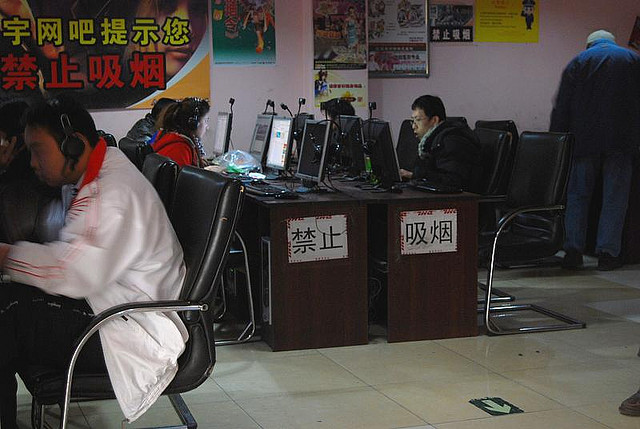A Guide to the Internet in China – Internet Addiction Posted by sasha on Jun 9, 2014 in Culture
In the last post about online gaming, we mentioned that the intense love for such games has had a negative social impact on the country. With so many people spending so much time glued to their computer screens, Internet addiction has become a serious issue in China. In this post, we’ll take a closer look at this huge problem and how the country is dealing with it.
Restrictions
To combat the problem, the Chinese government has set forth some restrictions. For starters, younger users had to register with their government issued ID. Time restrictions have also been implemented, so that if young gamers go over their allotted time, they don’t receive as many points. Not surprisingly, censorship has also come into play with online games. Here are the criteria for banning games in China:
- Violating basic principles of the Constitution
- Threatening national unity, sovereignty and territorial integrity
- Divulging state secrets
- Threatening state security
- Damaging the nation’s glory
- Disturbing social order
- Infringing on others’ legitimate rights
This short news clip highlights new restrictions on ‘net bars in China.
Death By Internet
You know that Internet addiction is a serious problem when people start dying from it. Take for example the case of a man who dropped dead over a computer in a ‘net bar outside of Beijing after spending days playing online games without sleeping or eating. Then there was the man who died in a similar fashion in Taipei, whose death went unnoticed for nine whole hours. Then there was yet another man in Guangzhou who died after a 3-day online gaming binge. With so many people dying, what is the Chinese government doing to solve the problem? The answer may surprise you…
Internet Addiction Boot Camps
With high pressure from parents, stress from the college entrance exam, and more, it should come as no surprise that millions of young Chinese turn to the fantasy world of online gaming as an escape. In fact, it’s estimated that 10% of Internet users under the age of 18 in China are addicted. Internet addiction has become such a serious problem in China that they’ve even set up boot-camp style facilities to help force people to kick the habit – just see this article from the NY Post. If you don’t believe it, just watch the short documentary called “Web Junkies” about this very phenomenon. In the film, a program administrator refers to online gaming in China as “electric heroin.” See for youself:
“Web Junkies”
These boot camps have provided a few horror stories of their own. Take for example the young boy who was reportedly beaten to death by teachers at one such camp in Guangxi province. Previously, camps even used electric shock therapy to “rehabilitate” patients, a process that has thankfully since been banned. Despite these horrific incidents, the demand still remains high for such facilities, and it’s doubtful that these will disappear anytime soon. It will certainly be interesting to see how the country deals with this growing problem going further, as they try to balance the positives of the economic side – vast profits generated from online gaming companies, and the negatives of the social side – hopelessly addicted youth, boot camps, and even death.

Build vocabulary, practice pronunciation, and more with Transparent Language Online. Available anytime, anywhere, on any device.
About the Author: sasha
Sasha is an English teacher, writer, photographer, and videographer from the great state of Michigan. Upon graduating from Michigan State University, he moved to China and spent 5+ years living, working, studying, and traveling there. He also studied Indonesian Language & Culture in Bali for a year. He and his wife run the travel blog Grateful Gypsies, and they're currently trying the digital nomad lifestyle across Latin America.





Comments:
Peter Simon:
Dear Sasha,
An interesting article again. However, you mention the death of a Chinese guy in Taipei as if you were saying he was a Chinese citizen as anyone else in Beijing, or Hangzhou, or Guangzhou. I know average people in the streets consider Taiwan part of the PRC, but since when have people in Taiwan, where Taipei is the capital, been carrying a PRC passport? How long has the Taiwanese government, police, military, economy etc. been directed from Beijing? How long has travel between the mainland and the island been free for all? How long has the Communist Party of the PRC been the rulers in Taipei? Haven’t you read about plans of the PRC military to attack Taiwan and overthrow their government which prompted the US to warn against any military action on their part across the straights?
You can’t defend such a blunder by saying that he was also Chinese. So are Chinese people living in Indonesia, the Netherlands, or Surinam, or any other country in the world. If anyone Chinese around the world is addicted to internet games, is he sent to a camp by the authorities in Beijing? Did you not have more than two examples of death by computer from mainland China to say ‘with so many people dying’ without including a politically scandalous example?
sasha:
@Peter Simon I wasn’t trying to start the “is Taiwan part of China” debate for the millionth time. Just referencing an article online about another “Internet overdose” in China. Thanks for the long post, but I think your political arguments are better made elsewhere.
David Lloyd-Jones:
Sasha,
Sorta reminds me of a thought I had back in the 1980’s. A couple of Russians came out with Lillypad, a cross-the-road game superior to the Western Frogger, and I thought “That seals it; the Soviet Union is doomed.”
Makes one wonder, is the USA’s problem not militarism but World of Warcraft?
Cheers,